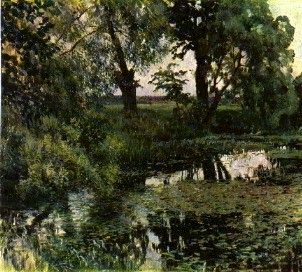

About Emigration
The motif of an exile In Warsaw „Stodola” (Barn) During his stay in Poland (6.06.1981) Milosz said: „My life resembles the adventures of the fairy-tale Stupid Johnny. The most stupid is to choose emigration." And „Emigration is a poison, A fatal thing. What I bore would kill a horse.” The motif of an exile appears constantly in all of the poet’s work. It appeared as for back as 1937 in the poem „In my homeland” (author’s own translation) prophetically foreseeing the exile’s fate. It was created under the influence of his leaving Wilno which he did not perceive as moving from one Polish town to another. It was a departure from Lithuania to Poland, from his motherland to strange surroundings. (Look also at „Family Europe”). In Milosz’s poetry one can find a lot of traces of the existance of Lithuania - homeland in poet’s memory.
THE YEAR (City without a
Name)
I looked around in the unknown year, aware that
few are those who come
from so far, I was saturated with sunlight as a plant
with water.
That was a high year, fox-colored, like a crosscut redwood
stump or vine
leaves on the hills in November.
In its groves and
chambers the pulse of music was beating strongly, running
down from dark
mountains, tributaries entangled.
A generation clad in patterned robes
trimmed with little bells greeted me
with the banging of conga
drums.
I
repeated their guttural songs of ecstatic despair walking by the sea when
it
bore in boys on surfboards and washed my footprints away.
At the
very border of inhabited time the same lessons were being learned,
how to
walk on two legs and to pronounce the signs traced in the always
childish
book of our species.
I would have related, had I known how, everything
which a single memory
can gather for the praise of men.
o sun, o
stars, I was saying, holy, holy, holy is our being beneath heaven and
the day
and our endless communion.
Berkeley, 1965
translated by Czeslaw
Milosz
and Richard Lourie
The poem „My faithful mother tongue” is devoted to such an understanding of a native land. In the work, different spheres of this nation and different attitudes of the poet are shown: gratitude and love of the homeland's lanquage, the feeling of isolation, hopelessness and resignation, aversion and protest against any connections with Polish character, the awareness of belonging to Polish culture, pride in the role of the defender of the moral order and the mother tongue defender. The whole poem is a kind of dialogue with himself. The starting apostrophe ”Faithful mother tongue”, which is repeated at the end of the poem assigns faithfulness to the mother tongue to the subject. Next, the poet creates the picture of faithful poetical service. Through many years he was bringing gifts to the Polish language. But this harmony of mutual faithfulness is disturbed, because there are not enough good people he could talk to. That is why despair, doubt appear, the thought of „squandered life." After all he did not choose the tempting softness of a carpet (it's a reference / allusion to the decision made in 1951 when he gave up wealth but also the subjection to authorities); he chose the difficult fate of an exile. The only thing that was left to him were little bowls of colors bright and pure, and awareness that it is necessary to save the Polish language. It was the exiled poet's role. The ending of the poem recalls one more time that poetry is a moral act „for what is needed in misfortune is a little order and beauty”
This page, in its earlier 1997 version (use right mouse to open in new window), was created by Aleksandra Kolodziejczyk, Iwona Kowalska, and Dariusz Plygawko, students of the Fifth General Education Liceum in Bielsko-Biala. Marcin Tomana and Piotr Kowalski of the School's Informatics faculty and Urszula Zajaczek of the Polish Language faculty, acted as advisors. Linguistic editing of current version by Peter K. Gessner.MY FAITHFUL MOTHER TONGUE (City without a Name)
Faithful mother tongue,
I have been serving you.
Every night, I used to set before you little bowls of colors
so you could have your birch, your cricket, your fmch
as preserved in my memory.
This lasted many years.
You were my native land; I lacked any other.
I believed that you would also be a messenger
between me and some good people
even if they were few, twenty, ten
or not born, as yet.
Now, I confess my doubt.
There are moments when it seems to me I have squandered my life.
For you are a tongue of the debased,
of the unreasonable, hating themselves
even more than they hate other nations,
a tongue of informers,
a tongue of the confused,
ill with their own innocence.
But without you, who am I?
Only a scholar in a distant country,
a success, without fears and humiliations.
Yes, who am I without you?
Just a philosopher, like everyone else.
I understand, this is meant as my education:
the glory of individuality is taken away,
Fortune spreads a red carpet
before the sinner in a morality play
while on the linen backdrop a magic lantern throws
images of human and divine torture.
Faithful mother tongue,
perhaps after all it's I who must try to save you.
So I will continue to set before you little bowls of colors
bright and pure if possible,
for what is needed in misfortune is a little order and beauty.
Berkeley, 1968
translated by Czeslaw Milosz
and Robert Pinaky
| Info-Poland a clearinghouse of information about Poland, Polish Universities, Polish Studies, etc. |